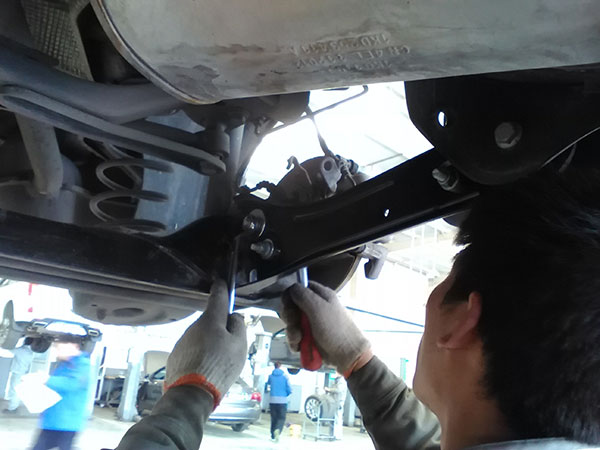Vehicle maintenance sector faces shake-up from new rules
By Li Fusheng (China Daily) Updated: 2015-08-31 13:26
 |
|
A mechanic repairs a car at a 4S shop in Baoji, Shaanxi province. Authorized 4S stores will no longer have a monopoly as the sector is opened up to competition. [Photo provided to China Daily] |
Information to go public to reduce monopoly practices
China's auto after-sales sector will face a shake-up when the government releases a guideline on car maintenance and repair that is expected in September.
The guideline, drafted by the Ministry of Transport, will demand that automakers in China make public information regarding the maintenance and repair of their vehicles.
Such information is now available only to authorized 4S stores and thus results in monopolistic practices and exorbitant costs in the sector.
"The guideline is in fact designed to do nothing more than return to the market what should have been decided by the market, thus offering a fair environment for different players in the sector," said Meng Qiu, an official at the Ministry of Transport.
She said when the guideline takes effect in 2016, those engaged in the after-sales sector will have to make their best endeavors to attract customers, which will result in better services at more reasonable prices.
High maintenance costs and expensive spare parts are among the top reasons that car owners leave 4S stores, according to a recent survey by the China Automotive Maintenance and Repair Trade Association.
The three-month survey of 25,167 respondents in 50 Chinese cities in 2015 shows that 72.5 percent of 4S store customers would return for further services while the figure was 80.4 percent for repair shops, said the association's deputy secretary-general Gai Fang.
People chose 4S stores for their professional service while they went to repair shops because of lower prices, the survey summarized.
Respondents in the survey gave 4S stores a score of 86.52 points, slightly higher than the score of 85.19 points they gave auto repair stores.
Gai said the result is because 4S stores do a better job in offering transparent services and customers have a more comfortable experience dealing with their staff than those at roadside repair shops.
The ratings were based on a number of indexes including professionalism, convenience, openness and maintenance costs.
Gai urged those engaged in the sector to improve their performance as customers are demanding better after-sales services as cars become a part of many people's daily lives and alongside such government regulations as the 3R regulationrepair, replacement or return - which took effect in late 2013.
"Success in the auto market will depend on whether you can provide good after-sales services," Gai said.
He said statistics show that after-sales services now account for at least 50 percent of 4S dealers' revenue and sales alone are "basically not profitable".
Meanwhile, many Internet-based maintenance businesses are mushrooming in large cities like Beijing, offering services at places and times designated by customers.
They are gaining popularity with young customers and might become strong rivals to traditional brick and mortar stores, Gai said.
"They won't replace traditional stores in the short term but it is a reminder for traditional stores to think carefully about how to attract and keep their customers."
lifusheng@chinadaily.com.cn
- 2015 China International Fair for Investment and Trade kicks off in Xiamen
- China's commodity imports robust in Jan-Aug period
- China stocks rebound 2.92%
- 2015 China box office already past 2014 total
- China foreign trade decline widens in August
- Interview: JP Morgan's senior executive bullish on China
- Innovation, development the focus for NZ mayors
- Lives of freelancers

















